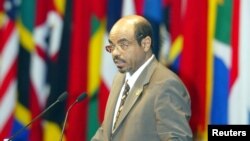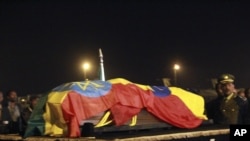The late Meles Zenawi led Ethiopia since a 1991 coup in which he helped overthrow the Marxist government.
The high-profile leader will be remembered for running a growth oriented, but very authoritarian, government. His illness was kept very quiet and during his life, no successor was publicly identified.
What will a post-Meles Ethiopia look like? Reporter Anita Powell spoke to Andrew Asamoah, a senior Horn of Africa researcher at the South Africa-based Institute of Security Studies.
VOA: Why has there been such secrecy around the prime minister’s condition and his death?
Asamoah: "We’ve seen that the trend in Africa is for the political leadership to keep the health status of the president to themselves, sometimes for political reasons; sometimes also I guess it’s also the fear of the uncertainty that may come up when their health status is made public. Because in some countries it ends up arming the opposition. So I think it’s the same case that’s played out in the case of Ethiopia."
VOA: Could Meles’ death lead to instability or violence?
Asamoah: "I think the threat about the instability that many are referring to is actually connected to the idea that he has been in charge of the country for so long and that he’s had an opportunity to make himself, or his personality, stand out to many of the goings on in the country. So [there’s] the fear that his sudden exit has the capacity of the dislocating the arrangements of the quality of the country."
Meles Zenawi
VOA: What’s next for Ethiopia? And who is going to lead the nation now?
Asamoah: "We expect the deputy prime minister to be in charge while the House of Representatives prepares to decide or elect whoever takes charge of the constitution. So there is clarity on that from the constitution of the country."
VOA: Let’s talk about Meles, the man. Meles was a very strong figure, he had a very strong cult of personality, and he was very involved in propagating the government’s message, or rather his message. What do you think was Meles’ legacy, and what might change now?
Asamoah: "I think his biggest legacy within the country and beyond has to do with the economic growth in the country since he assumed power. And his ability to keep the country strong and relevant on the African landscape, both in the Horn of Africa and at the [African Union] level.
I think the country will also miss his very strong personality, as someone who did not only represent the embodiment of the institutions of the country, but as well as who pulled a lot of ministers on his ideology and a number of things that he stood for.
And then also one of his roles as a key actor in the Horn of Africa in the case of Somalia. Let’s also remember that it was under his tenure that Ethiopia went to war with Eritrea. So all these things are some of his legacies.”
VOA: Ethiopia’s really strategically located in the Horn, and has a lot of neighbors - Somalia, Eritrea, Djibouti, Kenya - and it’s also home to the African Union. Could Meles’ death have any effect on these institutions and on these other nations and if so, what?
Asamoah: “[The] African Union has lost one of its pan-Africanists, he’s one of those people who stood for the African vision, who understood very well what it meant and what it means to uphold the African ideals and how to push for it. The Horn of Africa has also lost someone who was kind of pro-peace, even though I’m not sure all actors will agree that way.”
VOA: Meles has said, especially in recent years, that one of his greatest legacies was just maintaining stability and allowing Ethiopia to grow economically. So what do you think the government’s priority should be right now to maintain to keep things stable and peaceful?
Asamoah: “I think they should try and deal with whatever internal push and pull for power to make sure to ensure that the country remains as one country, one strong country.
And then I think it’s also up to the political leadership to continue to project the leadership role that Ethiopia has played in the region. Particularly it’s important for them to send out this message in the [event] of agitation or instability that there could be in the country.
That has a lot of influence and impact on the economic outlook of the country, investor confidence and then overall perception that the international community has of the country.”
The high-profile leader will be remembered for running a growth oriented, but very authoritarian, government. His illness was kept very quiet and during his life, no successor was publicly identified.
What will a post-Meles Ethiopia look like? Reporter Anita Powell spoke to Andrew Asamoah, a senior Horn of Africa researcher at the South Africa-based Institute of Security Studies.
VOA: Why has there been such secrecy around the prime minister’s condition and his death?
Asamoah: "We’ve seen that the trend in Africa is for the political leadership to keep the health status of the president to themselves, sometimes for political reasons; sometimes also I guess it’s also the fear of the uncertainty that may come up when their health status is made public. Because in some countries it ends up arming the opposition. So I think it’s the same case that’s played out in the case of Ethiopia."
VOA: Could Meles’ death lead to instability or violence?
Asamoah: "I think the threat about the instability that many are referring to is actually connected to the idea that he has been in charge of the country for so long and that he’s had an opportunity to make himself, or his personality, stand out to many of the goings on in the country. So [there’s] the fear that his sudden exit has the capacity of the dislocating the arrangements of the quality of the country."
Meles Zenawi
Meles Zenawi
- Born May 8, 1955 in Adwa, northern Ethiopia
- Suspended studies in 1974 to join Tigrai Peoples Liberation Front, TPLF
- Chairman of TPLF and Ethiopian Peoples Revolutionary Democratic Front since 1989
- Led EPRDF rebels to seize power in 1991 and became president
- Prime minister since being elected in 1995
- Serves as African Union spokesperson on climate change
- Praised for helping lift Ethiopia out of poverty after civil war
- Criticized for silencing all forms of dissent
- Known as ally with U.S. against terrorism
Asamoah: "We expect the deputy prime minister to be in charge while the House of Representatives prepares to decide or elect whoever takes charge of the constitution. So there is clarity on that from the constitution of the country."
VOA: Let’s talk about Meles, the man. Meles was a very strong figure, he had a very strong cult of personality, and he was very involved in propagating the government’s message, or rather his message. What do you think was Meles’ legacy, and what might change now?
Asamoah: "I think his biggest legacy within the country and beyond has to do with the economic growth in the country since he assumed power. And his ability to keep the country strong and relevant on the African landscape, both in the Horn of Africa and at the [African Union] level.
I think the country will also miss his very strong personality, as someone who did not only represent the embodiment of the institutions of the country, but as well as who pulled a lot of ministers on his ideology and a number of things that he stood for.
And then also one of his roles as a key actor in the Horn of Africa in the case of Somalia. Let’s also remember that it was under his tenure that Ethiopia went to war with Eritrea. So all these things are some of his legacies.”
VOA: Ethiopia’s really strategically located in the Horn, and has a lot of neighbors - Somalia, Eritrea, Djibouti, Kenya - and it’s also home to the African Union. Could Meles’ death have any effect on these institutions and on these other nations and if so, what?
Asamoah: “[The] African Union has lost one of its pan-Africanists, he’s one of those people who stood for the African vision, who understood very well what it meant and what it means to uphold the African ideals and how to push for it. The Horn of Africa has also lost someone who was kind of pro-peace, even though I’m not sure all actors will agree that way.”
VOA: Meles has said, especially in recent years, that one of his greatest legacies was just maintaining stability and allowing Ethiopia to grow economically. So what do you think the government’s priority should be right now to maintain to keep things stable and peaceful?
Asamoah: “I think they should try and deal with whatever internal push and pull for power to make sure to ensure that the country remains as one country, one strong country.
And then I think it’s also up to the political leadership to continue to project the leadership role that Ethiopia has played in the region. Particularly it’s important for them to send out this message in the [event] of agitation or instability that there could be in the country.
That has a lot of influence and impact on the economic outlook of the country, investor confidence and then overall perception that the international community has of the country.”






